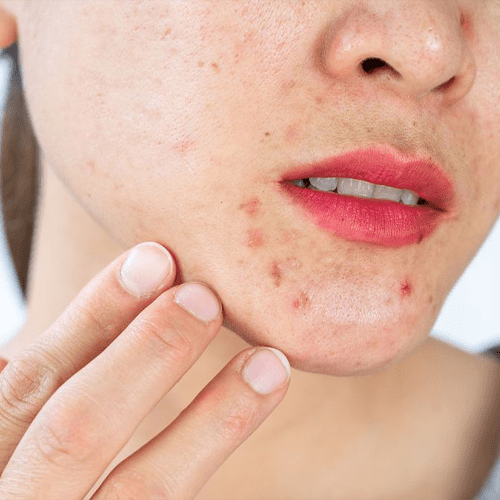Acne scars are the result of inflammation within the dermal layer of the skin caused by acne. When the skin tissue is damaged, the body produces collagen to repair the wound. In some cases, the body produces too much or too little collagen during the healing process, leading to the formation of scars.
There are different types of acne scars, including:
Ice Pick Scars: Small, deep pits that extend into the skin.
Boxcar Scars: Broad craters with sharply defined edges.
Rolling Scars: Scars with a wave-like appearance.
Hypertrophic Scars: Raised, firm scars that result from excess collagen production.
Atrophic Scars: Depressed or pitted scars caused by a loss of tissue.

Here are some common treatments for acne scars:
Topical Treatments: Creams containing ingredients like retinoids, alpha hydroxy acids (AHAs), or beta hydroxy acids (BHAs) can help improve skin texture and reduce discoloration.
Chemical Peels: A dermatologist can apply a chemical solution to remove the outer layer of the skin, promoting the growth of new, smoother skin.
Microneedling: This involves the use of a device with fine needles to create tiny punctures in the skin, stimulating collagen production and helping improve the appearance of scars.
Laser Therapy: Laser treatments can target specific areas of the skin, promoting collagen production and improving the appearance of scars.
Dermal Fillers: Injecting fillers into depressed scars can temporarily improve their appearance by adding volume to the skin.
Microdermabrasion: This procedure uses a machine to exfoliate the outer layer of the skin, helping to reduce the appearance of shallow scars.
Scar Surgery: In some cases, surgical procedures may be used to excise or improve the appearance of scars.
It’s important to consult with a dermatologist to determine the most appropriate treatment based on the type and severity of your acne scars. Additionally, protecting your skin from sun exposure and maintaining a good skincare routine can help prevent further damage and support the healing process.

ABOUT
Dr.Aiza
Dr Aiza Jamil is a one of the leading UK trained Consultant Dermatologist, laser and aesthetics. Dr Aiza Jamil did her dermatology training in Sheffield and works as Consultant Dermatologist in Manchester University Hospitals providing services to UK’s largest hospital, Manchester Royal Infirmary. She has also completed American Board Diplomate Certification in medical and cosmetic lasers from American Board of Laser Surgery making her unique in having both UK and USA qualifications.
Frequently Asked Question
Can You Get Rid Of Acne Scarring?
Yes, various treatments, including laser therapy, chemical peels, microneedling, and dermal fillers, can help reduce the appearance of acne scars.
Is Acne Scarring Permanent?
While some acne scars may fade over time, others can be permanent. However, with the right treatments, you can significantly improve their appearance.
How Do I Stop My Pimples From Scarring?
To prevent acne scars, it is essential to treat acne promptly and avoid picking or squeezing pimples. Additionally, using gentle skin care products and wearing sunscreen daily can help protect your skin.
Does Salicylic Acid Remove Acne Scars?
Salicylic acid effectively treats active acne by unclogging pores and reducing inflammation. However, it’s not typically used to remove acne scars. Other treatments like chemical peels or laser therapy may be more suitable for scar removal.
How Do Dermatologists Treat Scars?
Dermatologists use various treatments to address scars, including laser therapy, chemical peels, microneedling, dermal fillers, and surgical techniques like excision or punch grafting. The choice of treatment depends on the type and severity of the scars.


